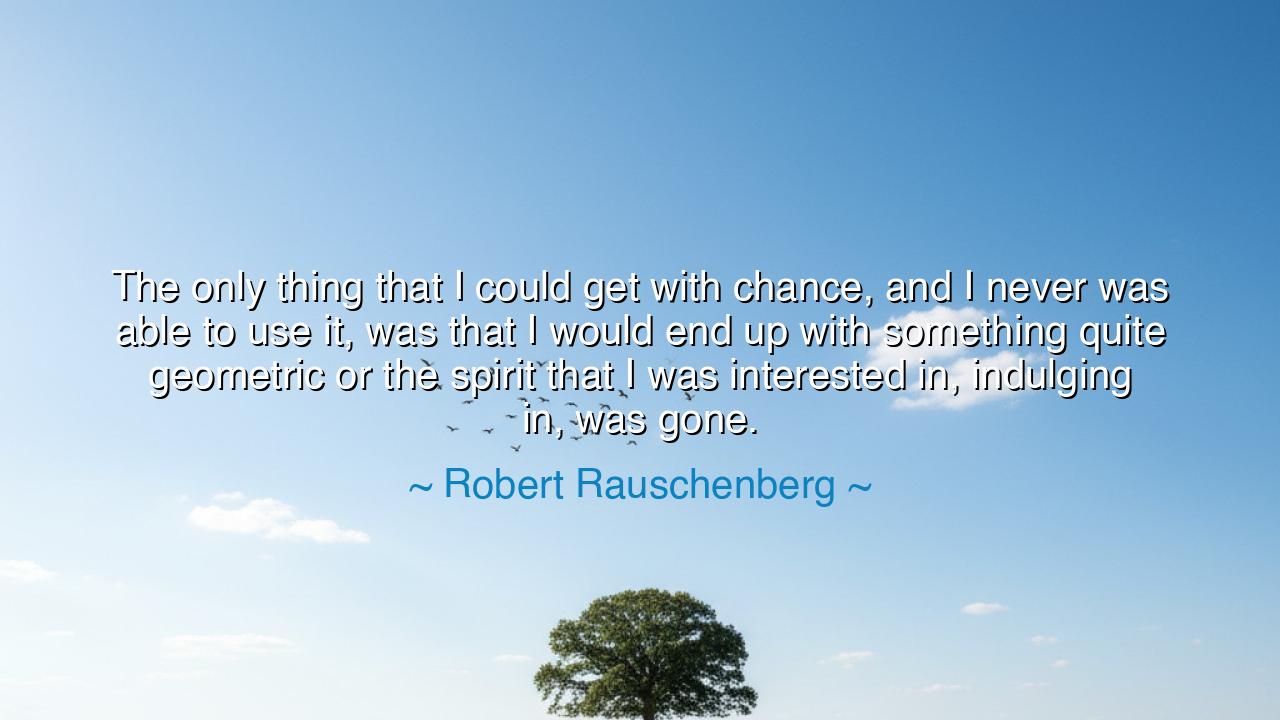
The only thing that I could get with chance, and I never was able
The only thing that I could get with chance, and I never was able to use it, was that I would end up with something quite geometric or the spirit that I was interested in, indulging in, was gone.






In the vast expanse of art and creativity, there are moments when the spirit of the creator seeks something deeper, more organic and authentic than mere structure or form. Robert Rauschenberg, one of the pioneers of abstract expressionism, expressed this truth when he said, "The only thing that I could get with chance, and I never was able to use it, was that I would end up with something quite geometric or the spirit that I was interested in, indulging in, was gone." Here, Rauschenberg touches upon the struggle of balancing the force of chance—that unpredictable element that often guides creativity—and the need to maintain the soul and intention behind one's work. The danger of relying too heavily on chance, he reveals, is that it can lead one astray, pulling the work into a realm that is too rigid, too structured, losing the very spirit that gives it life.
In the ancient world, the creative process was viewed as a divine endeavor, often guided by the will of the gods. The Greek philosophers like Plato believed that true beauty in art could only be achieved when there was a harmony between structure and spirit. Plato often spoke of the Forms, idealized versions of things, where the perfect form of a tree, a building, or a work of art existed in the realm of pure thought. But for Plato, the artist’s role was to capture the essence of those perfect forms while still infusing their work with the soul of the world. If the artist’s hand was guided too heavily by order or geometry, they risked distorting the true spirit of their creation. This tension between structure and spirit is at the heart of what Rauschenberg expresses—when too much chance leads to geometric results, the soul of the work, its deeper meaning, is often lost.
Consider the ancient Greeks' own approach to the arts—sculpture, for instance. The great Phidias, who created the statue of Zeus at Olympia, knew that the idealized form was not to be rendered merely through geometric precision but through the understanding of humanity itself. His statues did not simply embody mathematical proportions; they radiated the spirit of the gods they represented. Rauschenberg’s words echo this ancient pursuit—the artist must not lose their connection to the life force that makes their creation resonate. In Rauschenberg’s work, he sought to merge the randomness of chance with the intuitive spirit of the artist, recognizing that this balance is delicate and hard to maintain.
The great Michelangelo, known for his masterpieces such as the David and the Sistine Chapel ceiling, faced a similar dilemma. Though his work was rooted in the precision of the Renaissance ideals of proportion and perspective, Michelangelo was driven by an almost divine inspiration that went beyond mere geometry. He once said, "I saw the angel in the marble and carved until I set him free." Michelangelo’s art was an attempt to find that perfect balance—to follow the structure of the marble and the laws of physics while also channeling the spirit of his subjects. Like Rauschenberg, Michelangelo knew that without spirit, art would be reduced to a cold and lifeless representation, devoid of its deeper meaning.
The lesson from Rauschenberg’s reflection is one that speaks to all creators: whether in art, music, writing, or any other form of expression, balance is key. The use of chance or spontaneity in the creative process can lead to unexpected beauty, but it must not overwhelm the intention and the soul behind the work. Chance is a powerful force—it can break boundaries, introduce serendipity, and spark innovation. But without a guiding hand, it can also lead the work into a place that is too structured, too rigid, too detached from the essence of what was originally sought. As Rauschenberg learned, true creativity comes not just from letting go of control, but from maintaining a connection to the spirit of the work, no matter how chaotic or random the process might seem.
This understanding is not limited to the world of art alone. In life, we often face moments when we are pulled between the order of plans and the freedom of chance. It is a universal struggle, for too much structure can stifle growth, while too much freedom can lead to a lack of purpose. Whether you are building a career, a relationship, or a personal project, you must learn to walk the line between order and chaos, between intention and spontaneity. Like Rauschenberg, you must embrace the unexpected, but always remember that the true spirit of your endeavor lies not in its structure, but in the deeper meaning and purpose you bring to it.
In the end, Rauschenberg’s words challenge us to reflect on our own creative journeys—whether in our work, our passions, or our lives. Are we allowing too much control, too much structure, or are we embracing the beauty of chance, only to lose sight of our true purpose? The balance between chaos and order, between the spirit and the form, is what defines the true soul of any creation. In your own life, take the time to ensure that the spirit of what you create is always at the center of your work, for it is the heart that will give it life. Just as Michelangelo freed the angel from the marble, so too must you free your own vision, allowing the form to emerge from the soul that guides it.






AAdministratorAdministrator
Welcome, honored guests. Please leave a comment, we will respond soon